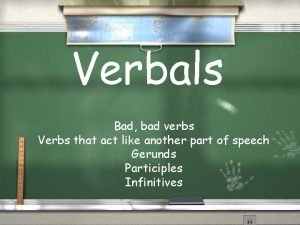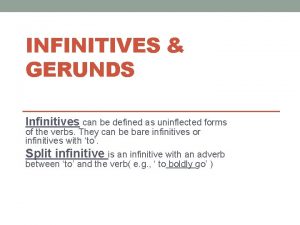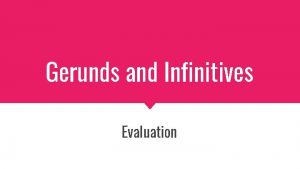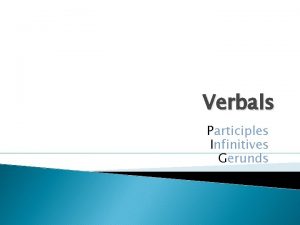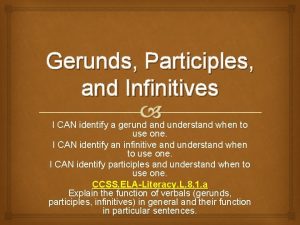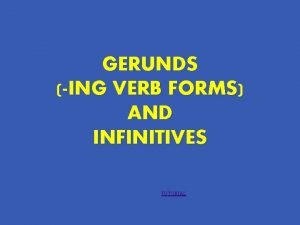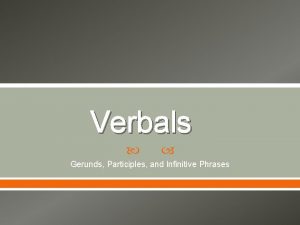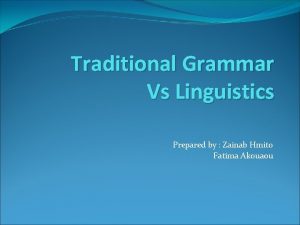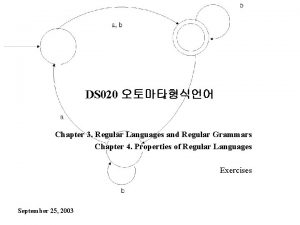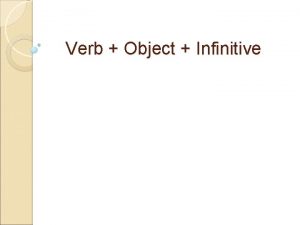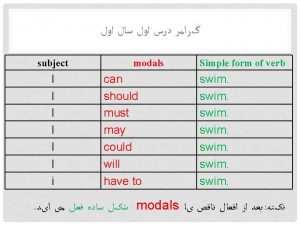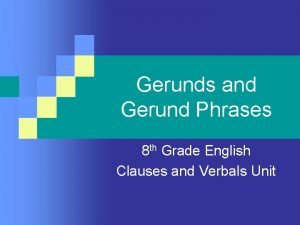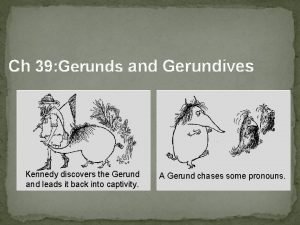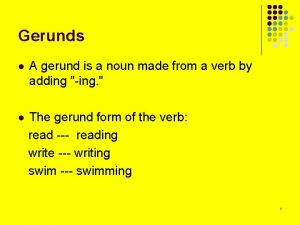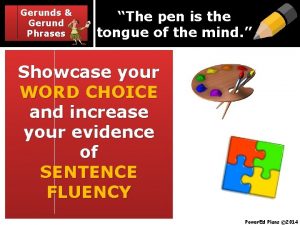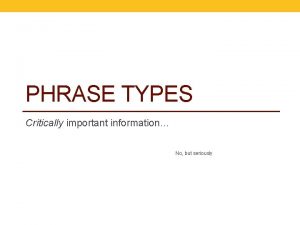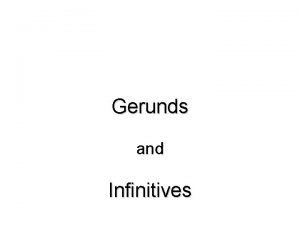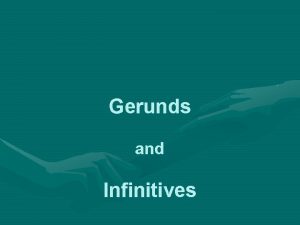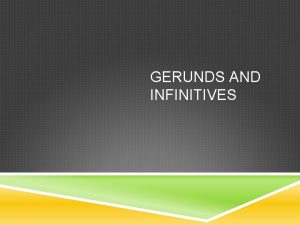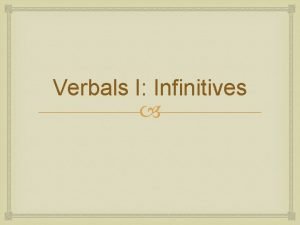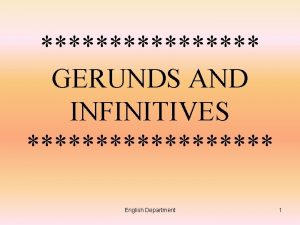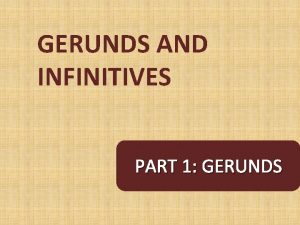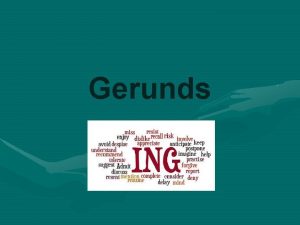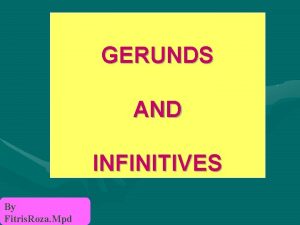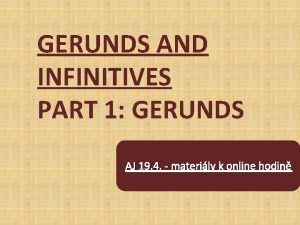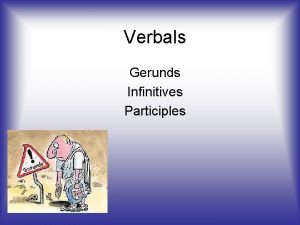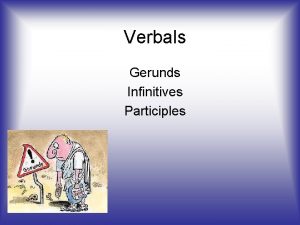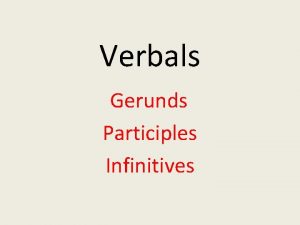Gerunds and infinitives Grammar III I CO 2011






























- Slides: 30

Gerunds and infinitives Grammar III I CO – 2011 by Carlos Roberto Mora

Infinitive • The uninflected form of the verb. • The infinitive form may be used alone or in conjunction with the particle to. • An infinitive is the base form of a verb with -to-

Infinitive (to) + Gerund • The infinitive after a verb often describes a future event. After: hope, expect, promise, want… the event in the to-infinitive comes after the activity or thought in the main verb: – I hope to see you next week. • Gerund describes an activity. – We enjoyed seeing you last weekend.

• afford / agree • learn / need • ask / decide • • • promise / refuse expect / fail tell / want hope / wish want / decide - to -

afford / agree • I agree to go to the USA trip this summer. • I can afford to buy this picture. learn / need • We should learn to do housework. • Humans need to drink water.

Hope / wish • I hope to meet Beckham in England. • I wish to fly up high in the sky. Want / decide • I want to do the homework today. • I decide to buy this book.

Expect / fail • We expect to pass the English exam. • We failed to do the homework. Tell / want • He wanted to tell her about his feelings.

Ask / decide • I asked my mum to go shopping with me. • I decided to go hiking this Sunday. Promise / refuse • I promised my mother to finish my homework this weekend. • I refuse to invite Mary to my party.

No major difference in meaning • Some verbs can be followed by either the infinitive or the gerund without any major difference in meaning: Begin Continue Start Intend • Mother Teresa started to live/living in the slums of Calcutta from 1948. • Though she faced many problems, Mother Teresa continued to work/working for the poor.

Gerund (general) to-infinitive (particular situation) • Some verbs are generally followed by the gerund when used in a general sense • The to-infinitive is often used for a particular situation. • I like swimming, but I don’t like to swim on cold days.

The Gerund is formed by adding “ing” to the base form of a verb • swimming • eating • running

The Gerund can be used… As a noun • Running is my favourite sport. (subject) • He tried running faster. (object) • She was afraid of losing. (object of preposition)

After adjectives + preposition accustomed to fond of successful in tired of capable of afraid of good at interested in • She is accustomed to training for many hours. • He is good at running the 200 meters race.

• • admit avoid delay deny enjoy finish keep mind - ing -

Admit • My brother admitted breaking the vase. Avoid • I avoid walking on busy streets. Delay • The school delayed opening this morning.

Finish • I finish doing my homework. Keep • After 4 hours, he keeps standing there. Mind • Would you mind lending your pen to me.

Deny • I deny doing a wrong thing • I deny being late to school every day. • I deny talking during the lesson. Enjoy • I enjoy playing computer games.

After verbs… admit keep advise appreciate understand can’t help try keep mind suggest finish enjoy dislike avoid forgive • John has finished repairing his bicycle. • They enjoy walking in the evening. • Mary dislikes swimming in winter.

I enjoy to swim. right I enjoy swimming. Which is correct ?

right I want to study. I want studying. Which is correct ?

I finish to eat. right I finish eating. Which is correct ?

right I need to study. I need studying. Which is correct ?

right I hope to study. I hope studying. Which is correct ?

I stopped to smoke. right I stopped smoking. Which is correct ?

Also… v Some verbs can be followed by either an infinitive or a gerund, with NO DIFFERENCE IN MEANING I like to read / I like reading v Some verbs can be followed by either an infinitive or a gerund, but THEIR MEANINGS ARE NOT THE SAME I will remember to call her. (I will be sure to call her in the future. ) I remember calling her. (I have the memory of calling her in the past. )

Gerunds are often used when actions are real, concrete or completed: Ø I stopped smoking. (The smoking was real and happened until I stopped. ) Infinitives are often used when actions are unreal, abstract, or future: Ø I stopped to smoke. (I was doing something else, and I stopped; the smoking had not happened yet. )

Summary table for (to) infinitive and gerund To infinitive 1. Use as subject Eg: To smoke is bad for you. Gerund (-ing forms) 1. Use as subject (more common) Eg: Smoking is bad for you. 2. To say why we do things 2. After prepositions (purpose) Eg: I got up early to catch the 7 am train. 3. After some verbs (expect, afford, want, need, prepare, refuse, choose, fail, learn, promise, hesitate. . . etc) Eg: I expect to pass the (on, in, before, for, without, after…etc. ) Eg: You can’t live without eating. Eg: Thank you for listening. 3. After some verbs (eg: dislike, enjoy, practise, mind, avoid, consider, discuss, finish, keep, miss, suggest, keep, can’t help…etc) Eg: I’ll finish studying in June.

Summary table for (to) infinitive and gerund To infinitive 4. After some adjectives and nouns: Adj = easy, happy, glad, nice, Gerund (ing forms) 4. After phrasal verbs: excited, ready, difficult, dangerous. . . etc; Noun = work, money to spend, something to drink, different ways to protect her. …etc) Eg: I am not good at dancing. Eg: I am not interested in singing. Eg: She is ready to leave. (adj) Eg: John will give up smoking. Eg: I am glad to see you. (adj) Eg: I’ve got work to do. (n) 5. Some verbs can be followed by either gerund or (to) infinitive: Eg: I love going to school/I love to go to school 5. Eg: Begin, continue, hate, love, start…etc.

Summary table for (to) infinitive and gerund To infinitive Gerund (ing forms) 6. Used in general sense (Eg: love, like, hate, prefer. . etc) Eg: I like swimming. 6. Used in particular situations Eg: I don’t like swimming on cold days. * Some words can use both toinfinitive and gerund with the same meaning. (Eg: love, like, begin, start, intend, continue. . etc) * Some words can use both toinfinitive and gerund with different meaning. (Eg: remember, try. . etc) 7. No + gerund Eg: No money, no talking. 8. Stop + gerund. Eg: Stop talking, stop writing, stop walking…etc.

 Bad verbs
Bad verbs Passive voice to infinitive
Passive voice to infinitive Perfect passive infinitive
Perfect passive infinitive Les mots invariables
Les mots invariables Remember to or ing
Remember to or ing Stories with gerunds and infinitives
Stories with gerunds and infinitives Esl jeopardy
Esl jeopardy Verbals examples
Verbals examples Gerunds participles and infinitives
Gerunds participles and infinitives Infinitives and participles
Infinitives and participles Having+
Having+ Jerunds
Jerunds Gerund meaning
Gerund meaning Ing gerunds
Ing gerunds Verbal participle examples
Verbal participle examples Gerund as subject examples
Gerund as subject examples Hamlet act iii scene ii
Hamlet act iii scene ii Right linear grammar and left linear grammar
Right linear grammar and left linear grammar Strength of traditional grammar
Strength of traditional grammar Unrestricted grammar
Unrestricted grammar Right linear grammar
Right linear grammar Verb+object+infinitive examples
Verb+object+infinitive examples Gustar + infinitive
Gustar + infinitive گرامر verb+object+verb
گرامر verb+object+verb Ing form of give
Ing form of give Gerunds and gerund phrases
Gerunds and gerund phrases Gerund vs gerundive latin
Gerund vs gerundive latin Gerund used as a noun
Gerund used as a noun Gerunds and gerund phrases
Gerunds and gerund phrases Difference between gerunds and participles
Difference between gerunds and participles Participles and gerunds
Participles and gerunds
